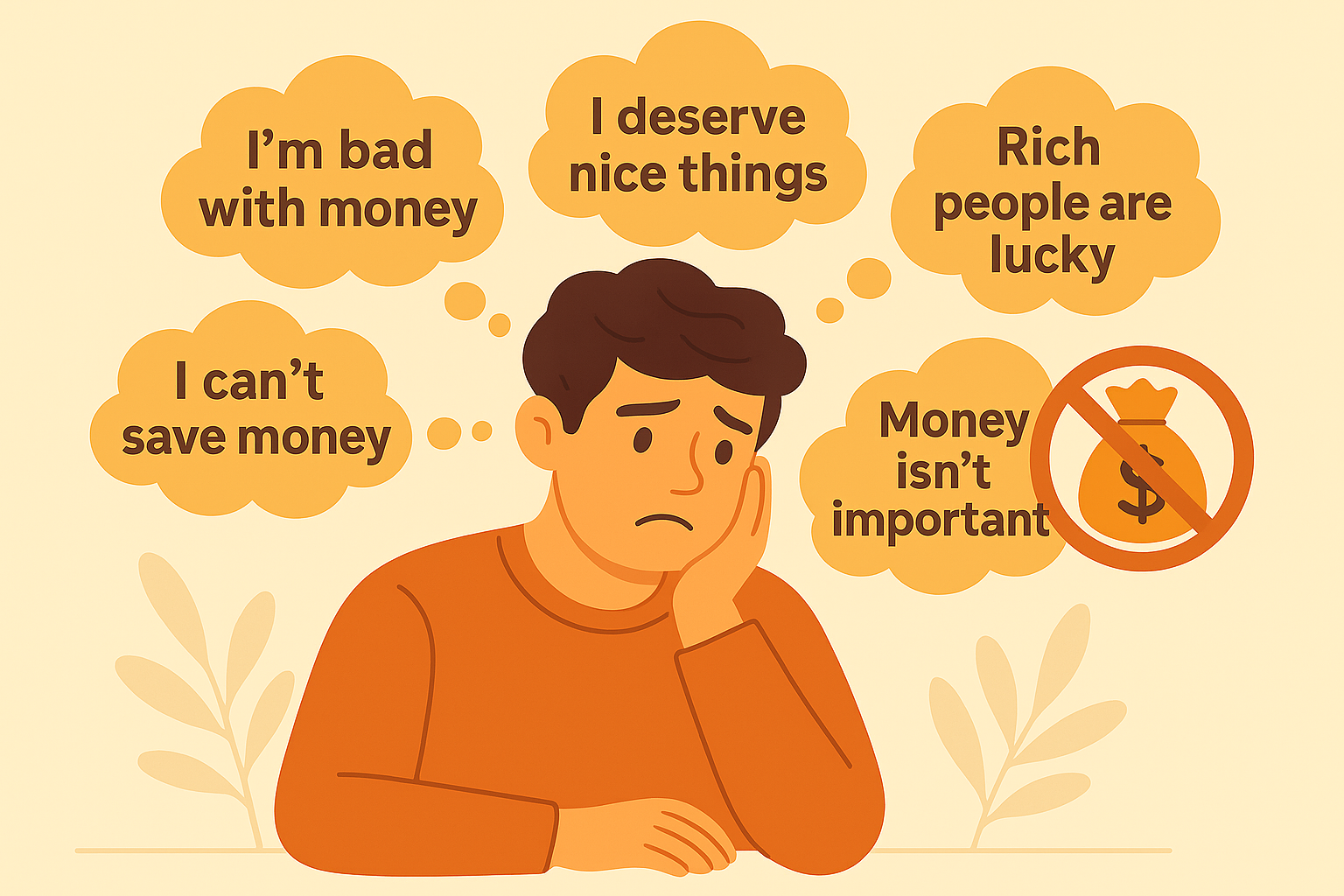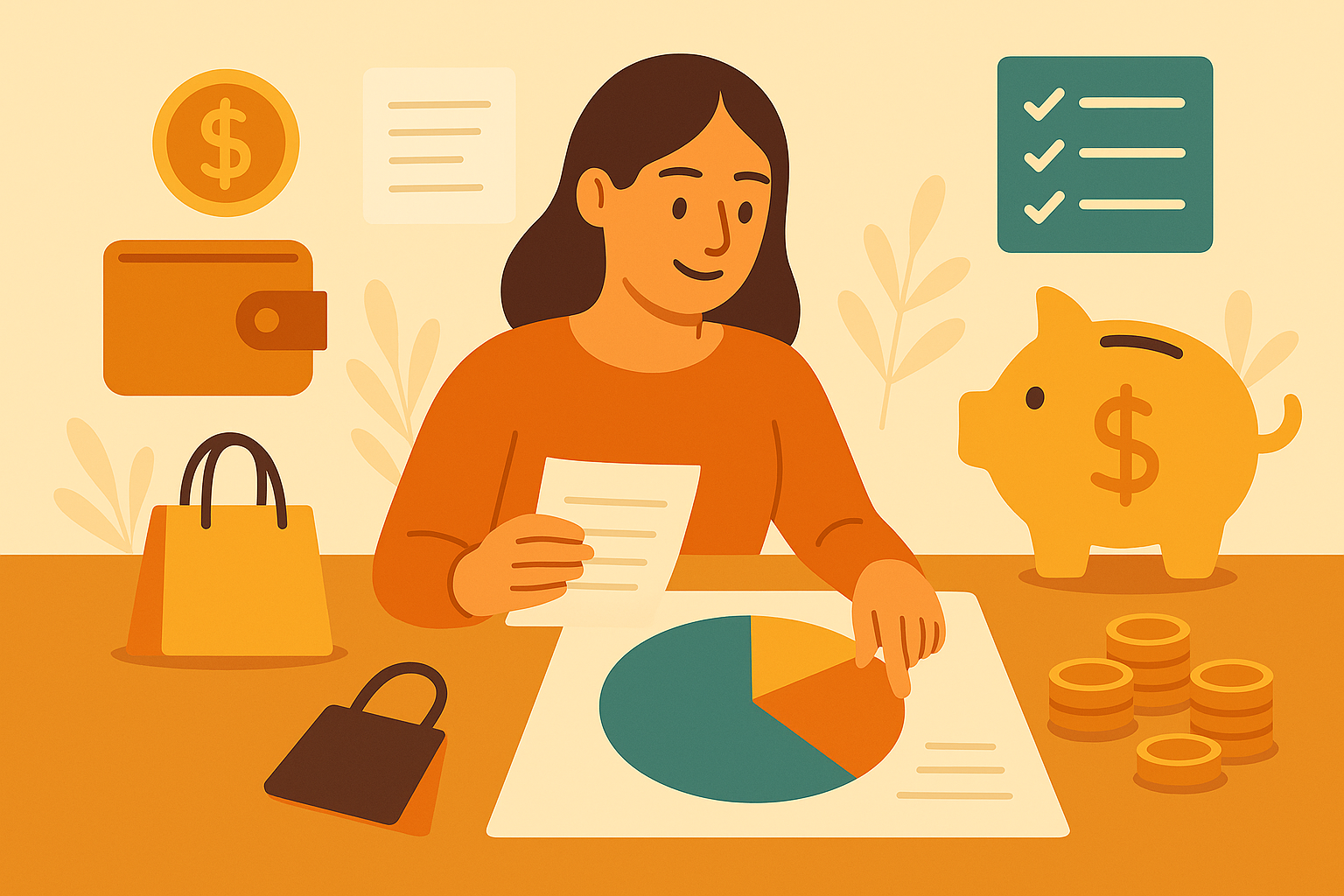Okay, real talk time. Do you ever feel like you’re just naturally terrible with money? Like some people are tone-deaf or can’t parallel park, maybe you’ve convinced yourself you were born without the “money gene.” Every time you check your bank account and see that depressing number staring back at you, you probably just shrug and think, “Welp, guess that’s just how it is for me.” But here’s the truth: your money beliefs are the actual reason you’re staying broke.
Here’s what most people don’t realize.
The issue isn’t that you suck at money. Instead, the problem is the money beliefs living inside your head – all these toxic ideas about money that you don’t even know you have. Unfortunately, these money beliefs are running on autopilot in the background, quietly wrecking every financial decision you try to make.
So today, I want to dig into the 10 money beliefs that might be keeping you stuck and broke. These aren’t just random negative thoughts – rather, they’re the actual mental barriers that stop so many of us from getting ahead financially, even when we’re busting our butts trying.
If you’ve ever felt like you’re doing everything “right” but still can’t get ahead with money? Yeah, this one’s for you. Let’s talk about the money beliefs that are sabotaging your wealth.
1. I’ll Never Make Enough Money to Save
This belief sounds almost logical when you’re barely covering rent and groceries. Saving feels impossible, right?
Why this belief keeps you broke:
When you believe you’ll never have enough to save, you don’t even try. As a result, you spend every dollar because “what’s the point of saving $20?” Meanwhile, time passes, your income might increase, but the belief stays the same. For example, you could be making $35,000 thinking you can’t save. Then you make $50,000 and still think you can’t save. Clearly, the income isn’t the problem – the belief is.
The reality check:
Almost everyone can save something. Even $5 per paycheck. I know that sounds ridiculously small, but here’s what happens when you start saving just $25 per paycheck: you prove to yourself that you can save. Consequently, that tiny action starts shifting your entire relationship with money.
How to change this belief:
Start with an amount so small it feels almost silly – $5, $10, $20 per paycheck. Next, automate it so you don’t have to think about it. Then, watch it grow for three months and see proof that you can save. Finally, gradually increase the amount as you build confidence.
The goal isn’t to save a ton right away. Rather, it’s to break the belief that you can’t save at all.
2. I Deserve to Treat Myself Because Life is Hard
You’ve had a rough week at work, you’re stressed about bills, and suddenly you’re thinking “I deserve a little happiness.” Next thing you know, you’ve spent $150 on stuff you didn’t really need and feel worse, not better.
Why this belief keeps you broke:
“Treat yourself” culture is everywhere, and it’s not entirely wrong – you do deserve good things! However, when treating yourself becomes your go-to response to every emotion, you’re using shopping as therapy. And therapy isn’t free.
The reality check:
Treating yourself occasionally is fine. On the other hand, using shopping as your primary coping mechanism for stress, boredom, sadness, or celebration is what keeps you broke. In fact, if you’re “treating yourself” multiple times per week, it could be costing you $400+ a month. That’s $4,800 a year that could be in your emergency fund.
How to change this belief:
First, ask yourself: “Am I actually treating myself, or am I avoiding a feeling?” Then, create a “treat yourself” budget – maybe $100/month for fun stuff. Additionally, find free or cheap ways to cope with stress like walking, calling a friend, or working out. When you want to treat yourself, wait 24 hours. If you still want it, and it fits your budget, go for it.
Real self-care isn’t just buying stuff. Sometimes it’s saying no to the purchase so you can say yes to financial peace.
3. Rich People Are Lucky or Had It Easy
Maybe you think anyone with money either inherited it, got lucky, or did something shady to get it. While this belief might make you feel better about being broke, it also keeps you stuck.
Why this belief keeps you broke:
If you believe wealth only comes from luck or immoral behavior, why would you even try to build it? Moreover, this belief turns wealth into something external and out of your control. It removes your power and agency. Plus, it makes you resent people who are doing well financially, which creates a toxic relationship with money itself.
The reality check:
Yes, some people inherit wealth. Yes, privilege exists. However, there are also millions of regular people who built wealth through consistent saving, smart investing, and good financial habits over time. They’re not all lucky or evil – many just made different choices and stuck with them.
How to change this belief:
Follow real people sharing their financial journeys, not just influencers flexing. Also, read stories of regular people who built wealth slowly. Focus on what you can control – savings rate, spending habits, investing. Most importantly, reframe wealth as something you’re building, not something that happens to you.
When you start seeing wealth as something you can create through your choices, everything changes.
4. I’m Just Bad With Money
How many times have you said this about yourself? It’s easy to label yourself this way and just accept it as fact.
Why this belief keeps you broke:
This belief is self-fulfilling. When you label yourself as “bad with money,” you give yourself permission to make bad money decisions. “That’s just who I am!” Consequently, it becomes part of your identity, and changing feels impossible because you’d have to change who you are.
The reality check:
You’re not bad with money. Instead, you just never learned good money skills. Nobody is born knowing how to budget, invest, or save. It’s learned, just like driving a car or cooking a meal. You’re not “bad with money” – rather, you’re untrained, operating on autopilot with beliefs you picked up from childhood.
How to change this belief:
Stop saying “I’m bad with money” out loud or in your head. Replace it with “I’m learning to be better with money.” Then, prove yourself wrong with one small win – track spending for a week, save $50, read one finance article. Finally, celebrate small financial victories to reinforce your new identity.
The day you stop identifying as someone who’s “bad with money” is the day you start getting better with money.
5. I’ll Start Saving When I Make More Money
Future you is going to be so much more responsible and have everything figured out, right? That’s what you keep telling yourself. But here’s the problem: that moment never comes.
Why this belief keeps you broke:
This is procrastination disguised as practicality. The truth? When you make more money, you’ll have more expenses. Lifestyle inflation is real. For instance, you could go from making $35k to $55k and somehow still feel broke because you’ve upgraded your apartment, car, and lifestyle. Therefore, the belief that “more income equals easier to save” is a trap.
The reality check:
The best time to start saving was ten years ago. The second best time is today. Starting small now beats waiting to start big later, because compound growth needs time. For example, even $50/month invested over 30 years at 8% returns becomes $73,000. Wait 10 years to start? It becomes $30,000. Ultimately, you lose $43,000 by waiting.
How to change this belief:
Start with whatever you can today, even if it’s tiny. Next, set up automatic transfers so future raises automatically increase your savings. When you get a raise, immediately increase your 401k or savings by at least half of it. Remember: it’s not about the amount, it’s about building the habit.
Starting with just $100/month might not make you rich overnight, but it gets you in the game, and that’s what matters.
6. Budgets Are Restrictive and No Fun
Maybe you think budgeting means saying no to everything fun and living like a monk. A lot of people have this belief, and it keeps them from ever creating a budget.
Why this belief keeps you broke:
If you think budgets are punishment, you’ll never stick to one. As a result, you’ll either avoid budgeting entirely and wonder where all your money went, or create an impossibly strict budget, break it, and give up. Either way, you stay broke.
The reality check:
A budget isn’t about restriction – instead, it’s about intention. It’s a plan for your money that includes fun, spending, and saving. In fact, when you create a realistic budget using something like the 50-30-20 rule, you can actually feel more freedom because you know you can spend your “fun money” guilt-free.
How to change this belief:
Reframe budget as “spending plan” if the word bothers you. Additionally, make sure your budget includes money for fun and enjoyment. Start with tracking before budgeting – just see where money goes for one month. Then, use a method that works for you. The 50-30-20 rule is simple and effective.
A budget that lets you spend $200/month on whatever you want, no questions asked, makes it easier to save. Permission to spend actually helps.
7. Investing Is for Rich People
Do you think the stock market is basically a casino for wealthy people? Are you terrified of losing money, so you keep everything in your checking account earning zero interest?
Why this belief keeps you broke:
Money sitting in checking accounts loses value to inflation every year. What costs $100 today will cost $103 next year with 3% inflation. Therefore, if you’re not investing, you’re actually losing money. Meanwhile, historically, the stock market has averaged 10% annual returns over time. By staying out of the market due to fear, you’re guaranteeing you’ll stay broke.
The reality check:
Investing isn’t gambling if you do it right. Index funds spread your money across hundreds of companies, reducing risk dramatically. Yes, the market goes up and down, but over decades, it trends up. Being so scared of losing money that you miss out on years of potential growth is the real risk.
How to change this belief:
Start learning about index funds and how they reduce risk. Begin with tiny amounts – even $50/month works. Additionally, use a target-date fund in your 401k for the set-it-and-forget-it approach. Remember: the risk of not investing and letting inflation eat your savings is actually bigger than the risk of investing in diversified index funds.
Once you understand that investing in index funds isn’t gambling but is actually the safe, boring way to build wealth, everything clicks.
8. I Need to Look Successful to Be Successful
New car, designer clothes, the latest phone – maybe you think looking successful will somehow make you successful. Instead, it just makes you broke and stressed.
Why this belief keeps you broke:
Trying to look rich is expensive. Really expensive. Every dollar you spend on appearances is a dollar not building actual wealth. Driving a car you can’t really afford, living in an apartment that stretches your budget, and buying clothes to impress people who don’t care – meanwhile, actual wealthy people? Many of them drive regular cars and live below their means.
The reality check:
Nobody cares as much about your stuff as you think they do. Furthermore, the people who do care aren’t the people who matter. Real success is having money in the bank, not looking like you do.
How to change this belief:
Unfollow social media accounts that make you feel like you need more stuff. Find one person you know who’s financially stable – notice they probably don’t show off. Before purchases, ask yourself: “Am I buying this for me, or for other people’s opinions?” Then, redirect one “appearance” purchase per month into savings.
The day you stop caring about looking rich is the day you start actually building wealth.
9. I’ll Deal With It Later
Future you is so organized, disciplined, and has everything together. Present you? You’re just trying to get through the week.
Why this belief keeps you broke:
Future you is the same person as present you. If you’re not dealing with your finances today, you won’t magically want to deal with them next month. Moreover, financial problems don’t solve themselves – they compound. That credit card debt? It grows. That lack of emergency fund? It becomes a crisis eventually.
The reality check:
Every day you wait to address your money situation is a day of potential growth you’re missing. Spending years saying “I’ll start budgeting next month” or “I’ll open that IRA soon” means next month turns into next year, and soon turns into years later. Eventually, present you has to deal with all the consequences of past you’s procrastination.
How to change this belief:
Do one money task today. Literally just one. Set calendar reminders for specific money tasks with deadlines. Make it stupidly easy – don’t plan to “fix all finances,” just “open savings account.” Remember: future you is counting on present you to show up.
Present you is the only you that can take action. Future you will be grateful you did.
10. Talking About Money Is Uncomfortable
Maybe you grew up thinking you just didn’t discuss money. It was private, taboo, even rude. So you never talked about it, never asked questions, and stayed ignorant.
Why this belief keeps you broke:
If you can’t talk about money, you can’t learn about it. You won’t know if you’re underpaid. Additionally, you won’t ask friends how they afford things. You won’t seek advice when you need it. Ultimately, this belief keeps you isolated in your financial struggles while everyone else is also struggling alone, unable to help each other.
The reality check:
Talking about money isn’t rude – it’s smart. In fact, some of the biggest financial breakthroughs come from conversations with friends about salaries, budgeting strategies, and investment accounts. The secrecy around money only benefits people who want to keep you uninformed.
How to change this belief:
Start small: talk to one trusted friend about one money topic. Join online communities about personal finance. Ask questions when you don’t understand something financial. Share your own journey.
The financial conversations you’re too scared to have right now? They could be the ones that change your life.
How to Actually Change Your Money Beliefs
Okay, so you’ve recognized yourself in some or all of these money beliefs. Now what?
Here’s a framework that actually works to transform your money beliefs:
Identify your specific money beliefs. Write down every thought you have about money for one week. The good, bad, and ugly. You can’t change beliefs you don’t acknowledge.
Question where they came from. For each belief, ask: Where did you learn this? From parents? Friends? Society? Just because someone taught you something doesn’t mean it’s true.
Find evidence against the belief. Your brain believes what you show it. Therefore, find examples of people who prove your limiting belief wrong. If you believe “I’ll never have enough to save,” find someone who started with less than you and saved successfully.
Take tiny actions that contradict the old belief. Beliefs change through action, not just thinking. For example, if you believe you’re “bad with money,” prove yourself wrong by doing one thing right. Track your spending for a week. That’s it. Small wins create new beliefs.
Be patient with yourself. You didn’t develop these beliefs overnight, and they won’t disappear overnight. You’ll catch yourself sliding into old thought patterns sometimes. However, the difference is noticing them and redirecting.
The Bottom Line
Your money beliefs are either building wealth or blocking it. There’s no in-between.
The money beliefs listed here aren’t exhaustive – you might have others that are unique to your situation. But here’s what you need to take away from this: your current financial situation is not permanent, and it’s not who you are.
If you’re broke right now, it’s likely because of beliefs and habits, not because you’re fundamentally bad with money or destined to struggle. Change the money beliefs, change the actions, change the results.
It won’t happen overnight. It’ll be uncomfortable. You’ll have moments where you slide back into old patterns. But I promise you, on the other side of these limiting money beliefs is a version of you that feels capable, confident, and in control of your financial future.
That version of you is worth the work.
Start with one belief. Question it. Take one tiny action that contradicts it. Build from there.
Future you is counting on present you to start today.
Which of these money beliefs resonated most with you? Or do you have a limiting money belief that wasn’t covered here? Drop it in the comments – let’s talk about it! Sometimes just naming your beliefs out loud is the first step to changing them.






